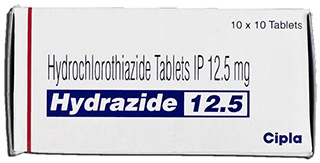Overview of Hydrochlorothiazide
Hydrochlorothiazide (HCTZ) is a prescription diuretic medication that is used to treat high blood pressure (hypertension) and fluid retention (edema) caused by various conditions, including heart failure, renal dysfunction, and liver disease. It belongs to a class of medications referred to as thiazide diuretics, often called water pill.
Pharmacological Action
HCTZ works by inhibiting the kidneys’ ability to retain sodium, increasing the excretion of sodium and chloride in approximately equivalent amounts. This action increases urine output (diuresis), which helps lower blood pressure and reduce fluid accumulation in the body.
Indications for Use
– Management of hypertension, either alone or in conjunction with other antihypertensive agents
– Treatment of edema associated with heart failure, cirrhosis of the liver, renal dysfunction, including nephrotic syndrome
– Off-label uses may include the treatment of diabetes insipidus and the prevention of kidney stones in patients with high levels of calcium in their urine
Contraindications
– Known hypersensitivity to hydrochlorothiazide or sulfonamide-derived drugs
– Anuria or renal insufficiency where renal function may further deteriorate
Dosage Forms and Strengths
Hydrochlorothiazide is available in tablet form in various doses, most commonly 12.5 mg, 25 mg, and 50 mg.
Administration Guidelines
– Taken orally with or without food, usually once daily in the morning to prevent nocturia and sleep disturbance
– Dosage must be individualized and adjusted based on patient response to therapy
Starting Dose Recommendations
– Hypertension: Initial dose of 25 mg once daily for most patients, may increase to 50 mg once daily based on response
– Edema: Initial dose of 25-100 mg once daily or divided into two doses
Dose Adjustment Considerations
– Renal impairment: Caution with dosing, may require lower dose or extended dosing interval
– Elderly patients: May require lower dose due to potential renal function decline
Common Side Effects
– Hypokalemia (low potassium levels)
– Dizziness or lightheadedness
– Hyponatremia (low sodium levels)
– Dehydration and electrolyte imbalance
– Headache
– Gastrointestinal disturbances such as nausea or loss of appetite
Drug Interactions
– Increased risk of hypokalemia with simultaneous use of corticosteroids or adrenocorticotropic hormone
– Attenuation of antihypertensive effect with nonsteroidal anti-inflammatory drugs (NSAIDs)
– Possible exacerbation of lithium toxicity in combination with hydrochlorothiazide
Monitoring Parameters
– Blood pressure, to determine the effectiveness in controlling hypertension
– Serum electrolytes (e.g., potassium, sodium, magnesium) to detect imbalances
– Renal function tests (BUN, serum creatinine) particularly in those with pre-existing renal impairment or during prolonged therapy
– Blood glucose levels, as HCTZ may affect glucose tolerance
Pregnancy and Lactation
Hydrochlorothiazide crosses the placenta and is detectable in breast milk. It should be used during pregnancy only if clearly needed and if the potential benefit justifies the potential risk to the fetus. Caution is advised when HCTZ is administered to a nursing mother.
Handling and Storage
– Store at room temperature away from moisture and heat.
– Keep the medication in its original packaging until use to protect it from light.
– Do not store in bathrooms or areas of high humidity.
– Properly dispose of any unused or expired medication.
Overdose Management
In case of overdose, supportive and symptomatic treatment should be instituted. Measures include induction of emesis or gastric lavage and correction of dehydration, electrolyte imbalance, and hypotension by established procedures.







Reviews
There are no reviews yet.